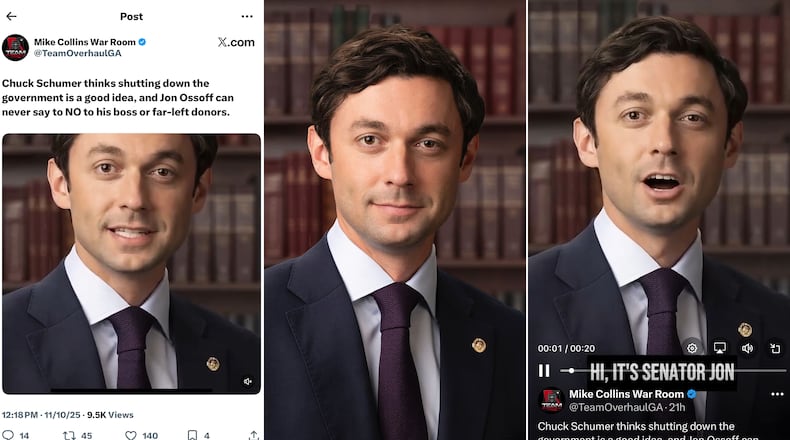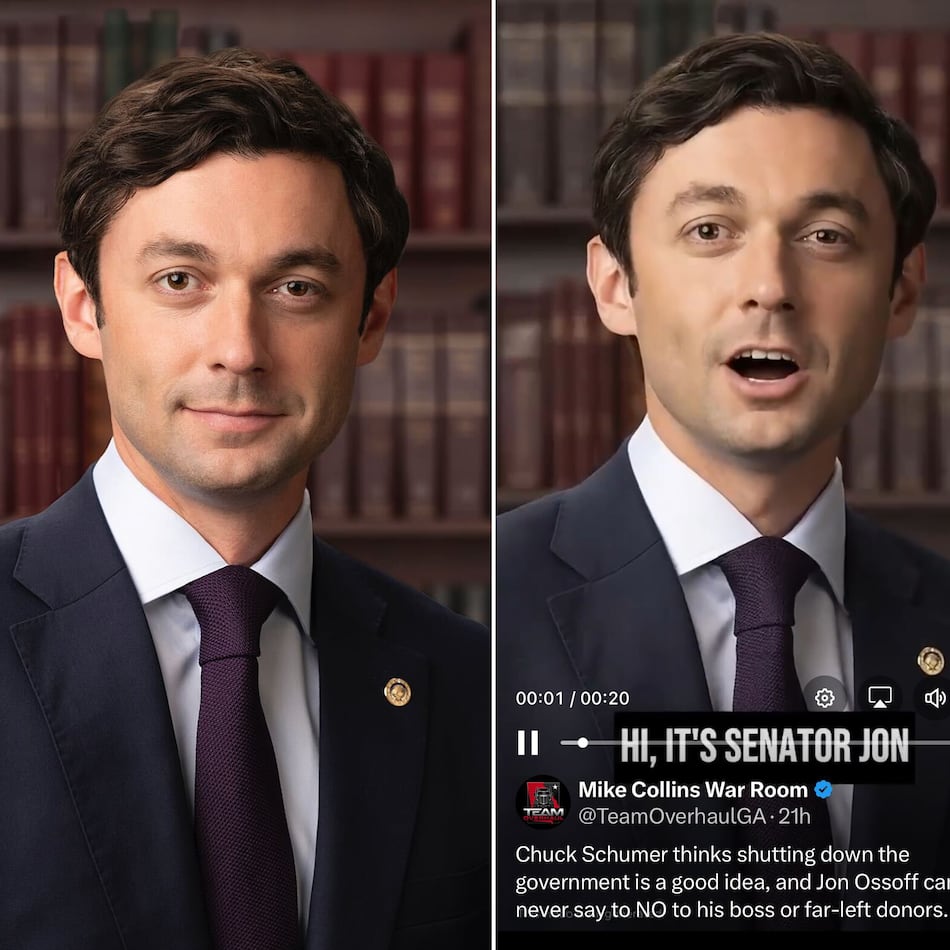I had a call from a friend this week. “Did you see that Ossoff video about the shutdown?” she asked about Democratic Sen. Jon Ossoff, incredulous that the Georgia Democrat would say what he was saying in the online video.
I hadn’t seen the video she was talking about, but a little looking turned up a clip of Ossoff on U.S. Rep. Mike Collins’ campaign X account. Collins, a Republican from Jackson, is one of three candidates in the heated GOP primary for Ossoff’s Senate seat.
“Hi. It’s Sen. Jon Ossoff. I just voted to keep the government shut down,” he says.
The video looks real enough, and it should since the image comes from Ossoff’s official Senate portrait, complete with a Senate pin in the lapel of his suit. But the words he says are over-the-top enough that it’s not entirely clear if the video is authentic or not.
In reality, it is a clip created by the Collins campaign with words they scripted for Ossoff and put in his artificial intelligence-generated voice.
“They say it’ll hurt farmers, but I wouldn’t know. I’ve only seen a farm on Instagram,” AI Ossoff says. “And SNAP recipients. Don’t think they’re at my New York or California fundraisers, so who cares?”
A small disclaimer tells viewers the video is generated by AI, but the disclaimer is only visible on a phone if you click the video to watch it on a full screen and click it again to eliminate the caption that covers it.
The Georgia Democratic Party slammed the video. “Instead of trying to deceive voters with deepfake videos, low-integrity Congressman Mike Collins should explain why he supports doubling Georgians’ health insurance premiums,” a spokesperson said.
But Collins’ campaign had no apologies for the video, nor any plans to stop doctoring Ossoff into new videos in the future.
“As technology evolves and creates new opportunities to reach and communicate with voters, the Collins campaign will be at the forefront embracing new tactics and strategies that pierce through lopsided legacy media coverage and deliver our message directly to voters,” a campaign spokesman said.
Credit: Arvin Temkar/AJC
Credit: Arvin Temkar/AJC
I’m guessing I’m the “lopsided legacy media,” but I’m not the only person who sees AI-generated videos from campaigns as going down the steep side of a slippery slope.
Republicans and Democrats alike have raised alarms in recent years about the dangers ahead, including Ossoff himself, who told a Senate Rules Committee hearing in 2023 that anyone could use AI to “willfully, knowingly and with extreme realism falsely depict you or any one of us, or a candidate challenging us, making statements we never made that’s indistinguishable to the consumer of the media from a realistic documentation of our speech.”
That’s where we are now. Fast-forward three or six months, and the Ossoff video could be further manipulated by others or just one in a sea of fakes about Ossoff, Collins and anyone else running for office in Georgia, no matter their party.
State Reps. Todd Jones, R-Cumming, and Brad Thomas, a Cherokee County Republican, have both endorsed Collins in his Senate race. Together they are also the leaders of an effort to criminalize the use of deepfakes in Georgia campaigns meant to deceive voters. Legislation introduced twice by Jones and Thomas would require clear disclosure of AI content and ban AI videos 60 days ahead of an election.
To drive the point home for some of their less tech-savvy colleagues about what is coming, Jones and Thomas created a deepfake of their own and played it at a House hearing in 2024.
The video showed state Rep. Colton Moore, R-Trenton, endorsing the AI bill that he had vocally opposed.
“If AI can be used to make Colton Moore speak in favor of a popular piece of legislation, it can be used to make any one of you say things you’ve never said,” AI Colton Moore says. “Are you prepared to deal with the consequences of allowing AI deepfakes to remain a viable and legal campaign strategy?”
The House has passed Jones’ and Thomas’ bills twice, but they both died in the Senate.
Jones said it’s crucial to safeguard First Amendment and free speech rights, but also that lawmakers act soon and get the fix right.
“The electorate has to know, in fact, not just who they’re voting for, but what that individual actually believes,” he said.
Is it possible to just ban all AI from American campaigns? If the impressed response I’ve gotten from other campaign operatives around Georgia is any indication, Collins’ AI-generated video of Ossoff is just the beginning of where campaigns are headed with AI.
The White House has routinely used AI to create outlandish videos in the fight for voters’ attention. There will be many more campaign to follow their with bigger, bolder, better AI fakes, even if the content is not really true.
“To the people who are saying it’s too late, is it?” Jones said. “It’s important that we get this straight, because the truth needs to be in the electorate before they make their vote.”
Until the Georgia Senate can pass Jones’ and Thomas’ very sound legislation, it’s “buyer beware” for the rest of us.
Before you watch a can-you-believe-it campaign video on social media like the one with Ossoff and ask a friend, “Can you believe it?” stop and ask yourself, “Can I believe it?” first.
As the AJC transitions to a digital-only format, you can now sign up to have Patricia Murphy’s columns sent straight to your inbox. Sign up at https://www.ajc.com/newsletters/patricia-murphy-columnist.
About the Author
Keep Reading
The Latest
Featured



